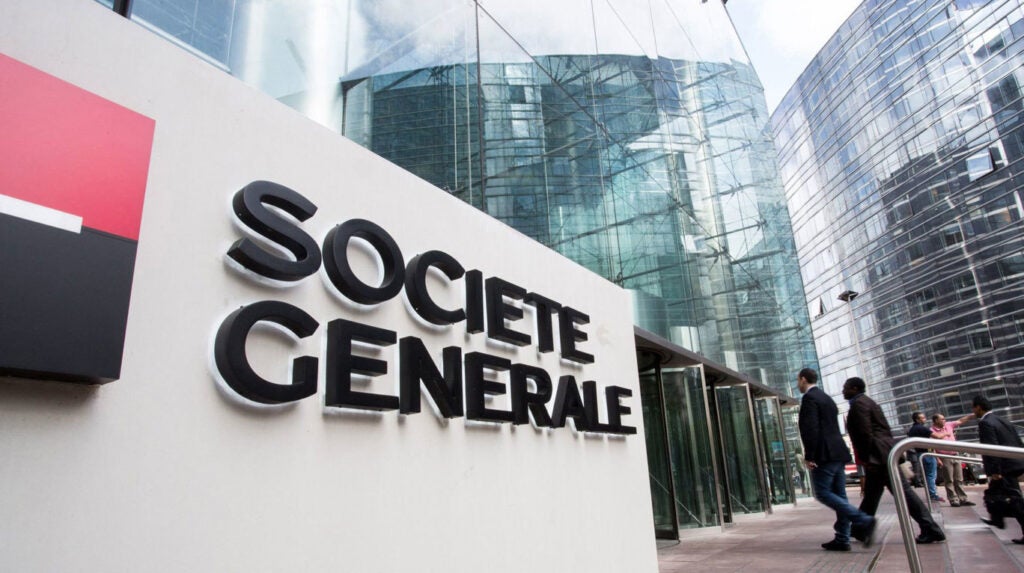
In 2011, Marie-Christine Ducholet took the reins at Société Générale Equipment Finance (SGEF) as chief executive officer, replacing Jean-Marc Mignerey as head of the French bank’s leasing division.
Ducholet had been a member of Société Générale’s specialised financial services and insurance management committee, and had held several roles within the group’s structured finance unit since she joined the bank in 1985, including the prior role of co-head of strategic and acquisition finance worldwide in 2008.
Last November, Ducholet’s colleague Patrick Gouin mentioned at the Leasing Life conference that asset finance is around 1% of all banking business transacted globally, and most in the market are of the opinion that asset finance must grow its market.
"The proportion certainly seems small compared to the size of the banking market as a whole," says Ducholet.
"However, the equipment financing businesses are an alternative financing method, which meet the needs of small and medium-sized companies in Europe more and more: flexibility, a reduced balance sheet and the technical expertise of financial backers."
No complacency
How well do you really know your competitors?
Access the most comprehensive Company Profiles on the market, powered by GlobalData. Save hours of research. Gain competitive edge.

Thank you!
Your download email will arrive shortly
Not ready to buy yet? Download a free sample
We are confident about the unique quality of our Company Profiles. However, we want you to make the most beneficial decision for your business, so we offer a free sample that you can download by submitting the below form
By GlobalDataWhile it’s important to note that SGEF took the Vendor Finance Leasing Life award in Warsaw this year, there’s no room for complacency. "Our objective is to help our industrial partners in financing their sales and to strengthen our position as leader in this field, says Ducholet.
"To provide our partners with a consistently more professional and efficient service we’ve enhanced our vendor approach by creating the international vendor management department, which is dedicated to our industrial partners and services. This support enables us to be the partner for small and medium-sized companies in Europe and the world, notably in developing countries."
The last couple of years have been better for asset finance after the global financial crisis in 2007 and 2008. But there are threats to international lessors through varying interest rates, eurozone-related central bank bailouts, or political disturbances. The European economic situation is volatile. Yet SGEF’s size and supportive parent is something Ducholet highlights as a main strength in combatting the unknown.
"We don’t feel particularly threatened in this business, especially as the fact that we belong to one of the world leading banking groups enables us to access not only all real economy sectors, but also an extensive geographic coverage."
The rise of digital systems, communications, advances in payments systems and assets that have internet connectivity have changed the way lessors have done business, including advances in life cycle management.
As banks and parents catch up with a systems and processes revolution that challenges the front-room and back-room interaction, Ducholet remains positive that this can be harnessed.
"For us, it’s not a question of disruption but a great opportunity. Our partnerships with some of the big names in the high-tech industry put us in a good position to respond to our customer’s latest needs.
"We’re at the forefront of internet-based financing solutions, for example. The major players in the latest communications technologies, whose development we help with, propose more and more innovative services. It’s these innovations that we finance for our end-customers.
"Our group is also at the forefront of all digitalisation aspects which means we are able to handle our customers’ requests each day with greater mobility, reactivity and rapidity.
SGEF operates in more than 25 countries. As Europe contends with a wide variety of political and economic challenges, from conflict in Ukraine to the Greek financial crisis, and, on an asset finance level, widely different country needs and requirements, SGEF is well placed to have an awareness of the challenges of being a European lessor.
"Europe is united in the sense that our partners themselves are present on the continent and bring their products and solutions there," says Ducholet.
"This is also the case of Société Générale Equipment Finance, which covers almost all European countries. Our aim remains to adapt to our customer’s requests on the ground and, as a result, to bring local solutions which conform to the regulatory and market situation and the specific need of both the end-customer and of our partner vendor."
While there have been volatile moments for loan pricing as interest rates change and central banks adjust interest rates, Ducholet takes heart in the strengths of the products that the international lessor funds.
"Given our partnerships and the quality of materials that we finance, pricing and inflation remains stable," she says. "It’s one of the major advantages which we attribute to the fact that our partnerships are established with the uncontested industry, transport and high-tech leaders.
"The crisis has perhaps had an effect on risk profiling and certain financing businesses. This is not the case in the leasing industry, in which the value of the financed asset secures the transaction and enables numerous companies to have access to the equipment financing business as a result.
The stability that SGEF has because of its size also brings with it responsibilities, not least with reference to the ongoing efforts surrounding sustainability, green leasing and attitudes to the environment.
"As an entity of the Société Générale Group, Société Générale Equipment Finance adheres to the group’s CSR values very closely," says Ducholet. "Our deputy chief executive officer, Séverin Cabannes, used to say: ‘We’re aware of our responsibility to serve the economy and to promote development, and we incorporate sustainable development considerations both into our long-term strategy and in the day-to-day operations of our banking business’."
But whereas positive attitudes to sustainability at the French lessor have a tradition, there’s fresh thinking with regards to one of asset finance’s weak points: gender imbalance.
"Our group is particularly attentive to gender balance, and has put ad hoc policies in place to value women’s skills in the bank’s businesses," says Ducholet.
"That’s why 40% of the SG Board are women. As a subsidiary of the Société Générale Group, Société Générale Equipment Finance is naturally engaged in this policy. First of all, SGEF finances environmental projects whenever the occasion arises," says Ducholet.
"The SG group is also extremely concerned about social responsibility and implements a number of projects to help the most deprived, notably people excluded from the workplace.
"For my part, I am on the board of the Société Générale Corporate Foundation for Solidarity, whose main goal is to give young people, who risk being excluded from the job market, access to employment opportunities. The foundation only considers projects carried out by charities, non-profit organisations and social enterprises, mainly in France, but also in countries where Société Générale is established.
"In 2015, the Société Générale Corporate Foundation for Solidarity is widening its scope to include integration and education through sport and cultural activities, while at the same time continuing its involvement in professional integration, particularly by helping young people to access the job market and by tackling illiteracy.
"A successful vocational training cannot be parted from a basis of strong knowledge. The foundation wishes to answer these inequalities by supporting actions such as the fight against illiteracy.
"Innovation in business is a well-used phrase. A lot of corporates use it to show willing without being able to effect any change because of the size of their business, or that assent for change is required from above. If experimental change in business process affects profitability, or if costs rise due to the element of support needed for ‘innovative’ projects, this can be adverse to the business as a whole. Often innovation is used to show willing, but in practice left on the sidelines because of the disruption it causes to business."
While leading the field with regards to innovation in public responsibility, Ducholet is critical of the idea that innovation as an idea in leasing has become stale.
"I do not share your opinion regarding the fact that nothing changes in terms of innovation," says Ducholet.
"At Société Générale Equipment Finance, and more broadly in the Société Générale Group, innovation is at the heart of our concerns. We pay attention to the quality of our tools and client contact and have launched numerous online trading systems for our partners. In a number of countries, the Société Générale Equipment Finance-vendor-lessee relationship is now performed entirely electronically."
Ducholet is agnostic on threats to the industry, and highlights the structure of a large lender as its strength.
"The leasing industry is made up of three main levers: a lessor, a vendor and a lessee," says Ducholet.
"It’s governed by this ‘troika’ in that sense. The close-knit relationship between the three actors is the driving force for change and innovation. The industry therefore is never forced to change but it organises itself in terms of how it evolves according to the needs of the three composing elements, namely the partners.
"The industry has developed shared think tanks, such as Leaseurope or the Leasing Foundation, for example, which contribute to the change and permanent adaptation of our sector."







